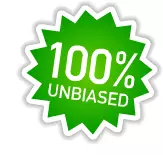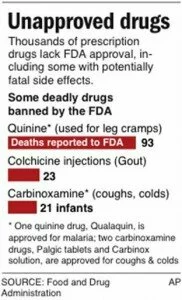 Too many Americans today are basing their opinions on prescription drugs solely on advertising by drugmakers. You should never get all your information from pharmaceutical commercials, Web sites, or drug labels.
Too many Americans today are basing their opinions on prescription drugs solely on advertising by drugmakers. You should never get all your information from pharmaceutical commercials, Web sites, or drug labels.
Why, you might ask? Aren’t drugmakers required by the FDA to tell the truth about their medications?
The answer is, yes and no. Drugmakers are required to tell you about the potential side effects and drug interactions associated with their medications. But the FDA recently warned drugmakers that they are not emphasizing these enough in their ads.
An even more critical omission from drug ads is that they don’t tell you that there are often less expensive generic drugs that are just as effective.
So for unbiased information on drugs or treatments you are interested in learning more about, here are four independent sources that have no ties to, and accept no advertising from, pharmaceutical companies:
1. Consumer Reports Health. Consumer Reports is perhaps the single best source for unbiased drug information, because it has never accepted advertising and is operated by the nonprofit Consumers Union. To access Consumer Reports information, you do have to pay a small subscription fee (less than $20 per year), but it is well worth the price.
2. RxFacts.org. RxFacts.org, the Independent Drug Information Service (iDiS), provides doctors and patients with an evidence-based, non-commercial source of the latest findings about prescription drugs. The Independent Drug Information Service is sponsored by the Pennsylvania Department of Aging, and its clinical content is created by an independent group of physicians and researchers on the faculty of Harvard Medical School. The only downside to this resource is that only a limited number of drugs are currently overviewed on the site.
3. Wikipedia. The mainstream media has done a disservice to Wikipedia by focusing on errors in its entries. Wikipedia is the seventh most visited site on the Web for good reason. Independent surveys have shown that, on average, Wikipedia is similar in accuracy to other encyclopedias. And as an ad-free resource that is not influenced by the pharmaceutical industry, it has great value as a starting point for your research. If you are unsure about any of the information you see in a Wikipedia entry, click on the footnotes in that entry that are required to document facts — which will generally send you to the original source material.
4. eDrugSearch.com’s Online Pharmacy Dictionary. As a free service to members, eDrugSearch.com provides an online pharmacy dictionary of more than 200 commonly prescribed drugs. When you click on an individual drug name, you’ll see news updates on the drug from the Associated Press and other sources, as well as drug information from the FDA. Members of the eDrugSearch.com Community can also view member drug reviews and ratings for more than 100 medications.
 An Associated Press analysis last week concluded that millions of Americans are being prescribed drugs — including those covered under Medicaid — that have never been reviewed by the FDA for safety and effectiveness. The FDA admits there may be thousands of such drugs on the market. Reports the AP:
An Associated Press analysis last week concluded that millions of Americans are being prescribed drugs — including those covered under Medicaid — that have never been reviewed by the FDA for safety and effectiveness. The FDA admits there may be thousands of such drugs on the market. Reports the AP:
“At a time when families, businesses and government are struggling with health care costs and 46 million people are uninsured, payments for questionable medications amount to an unplugged leak in the system … But the FDA estimates they account for 2 percent of all prescriptions filled by U.S. pharmacies, about 72 million scripts a year.”
This isn’t a new problem — most of the drugs in question have been on the market for five decades or more — but it’s a story that gets more galling over time. The history is, it was only in 1962 that the FDA began reviewing new medications for safety. Medications already on the market at that time were to be vetted by the FDA eventually … but 46 years later, thousands of meds have never been reviewed at all.
According to the AP:
It might be easier to sort things out if the FDA compiled a master list of unapproved drugs, but the agency hasn’t. FDA officials say that would be difficult because many manufacturers do not list unapproved products with the agency. Yet, the AP found many that were listed — a possible starting point for a list.
Among the drugs the AP’s research identified were Carbofed, for colds and flu; Hylira, a dry skin ointment; Andehist, a decongestant, and ICAR Prenatal, a vitamin tablet. Medicaid data show the program paid $7.3 million for Carbofed products from 2004 to 2007; $146,000 for Hylira; $4.8 million for Andehist products, and $900,000 for ICAR…
Federal law does not provide fines for selling unapproved drugs, and criminal prosecutions are rare.
This is another instance where it’s in your interest to do your own research on the drugs you are prescribed. Many doctors and pharmacists are unaware that drugs they are prescribing and dispensing have never been vetted by the government — but you can find out for yourself with a little Internet searching.
Drugs@FDA is an FDA Web site that allows you to search government-approval information on “most of the drug products approved since 1939.” Additionally, the site includes “the majority of labels, approval letters, reviews, and other information available for drug products approved from 1998 to the present.”
The FDA offers other resources for determining if a drug is approved here.
For FDA updates and AP news on 200 of the most commonly prescribed drugs, you can also check out eDrugSearch.com’s Online Pharmacy Dictionary.
 We assume that eDrugSearch.com users already take Wikipedia with a grain of salt, but just in case you needed some further convincing:
We assume that eDrugSearch.com users already take Wikipedia with a grain of salt, but just in case you needed some further convincing:
AttorneyatLaw.com reports that Wikipedia entries on prescription drugs “may exclude important information about life-threatening side effects and drug interactions,” according to researchers from Nova Southeastern University in Palm Beach Gardens, Florida.
As you know, we at eDrugSearch.com are all about healthcare consumers empowering themselves by learning about drugs online. We think our online pharmacy dictionary is an excellent source for this information, because it is comprised of data from sources like the FDA and, for breaking news updates, the Associated Press. In addition to our online pharmacy dictionary, there are a number of other good sources out there as well.
Unfortunately, Google is in love with Wikipedia — which means that when you search for many prescription drug names, the Wikipedia entry is one of the first selections that will pop up in your browser. Please, resist the urge to base any medical decisions on information on Wikipedia; use it only as a starting point for further research — both online and in consultation with your doctor or pharmacist.
-
 Subscribe in a reader
Subscribe in a reader -
Ads

-
-
How to Safely Buy Prescription Drugs Online from Cary Byrd on Vimeo.
-
Medi-Share: Christian Health Insurance Alternative

-
Search Blog Posts
-
Blogroll
- DrugWonks.com
- Eye on FDA
- Health 2.0
- Kevin, M.D.
- Pharm Aid
- Pharma Marketing
- PharmaGossip
- Pharmalot
- The Health Care Blog
- The Peter Rost Blog
- World Vision
-
Our Healthcare100 Ranking
-
Archives
-
Tags
adverse drug reactions Affordable Care Act big pharma Canadian drugs canadian pharmacies canadian pharmacy compare drug prices consumer reports CVS pharmacy divine healing Drug costs Drug Importation Drug Prices eDrugSearch.com FDA Fosamax healing scriptures Health 2.0 healthcare100 healthcare reform high drug costs Hypertension Jehova Rophe Jesus Christ Lipitor mail order pharmacies Medi Share miracles Obamacare online pharmacy dictionary osteoporosis personal drug importation Pharmacies pharmacy spam Prescription drugs Proverbs 3:5-8 reimportation relenza Roche rogue online pharmacies saving money Tamiflu The Great Physician The Lord our Healer wal-mart